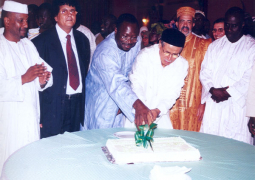The National Council for Civic Education (NCCE) recently held a daylong sensitization training on the 2002 Amended Local Government Act for village development committee members drawn from various villages in the Upper River Region (URR).
The participants, numbered about fifty, came from Samba Tacko, Koba Kunda, Kabakama and Basse Mansajang.
The training, funded by the UNDP, was held at the Basse Mansajang kunda.
Speaking at the sensitization meeting, Kebba O. Jobe, a civic education officer, said the forum was held to capacitise village development committee members from the communities mentioned above on not only their formation but also their roles and responsibilities.
“The training will build the capacities of the participants given the fact that village development committees (VDCs) are the entry point of all development activities in the village, noting that they should be able to know their functions which will enable them to work according to their mandate,” he noted.
The training informed participants about preparations of 2013 local government elections, Jobe said, adding that participants were exposed to various issues of the content of the act including dissolution of the council’s terms of a councillor, cessation of office, development plans, development structures, composition of VDCs and functions of ward development committees (WDC) among others.
The training will help the participants to differentiate between political agenda and development agenda because these are the development structures like the VDC and the WDC.
The training, according to Mr Jobe, was meant to capacitise participants on their roles and responsibilities in their drive to plan and implement any development projects at the village level.
For his part, Ansumana Yarbo, civic education officer, revealed that the project aimed at raising awareness on the civic rights of the local people. This, he added, cannot be realised in the absence of good governance.
He noted that for a village to realize sustainable and meaningful development there must be a well constituted VDC, according to the Local Government Act (2002).
“We have to look at the concept of VDC, why VDC, and how VDC is constituted? Who should be a member, VDC limitations and their roles and responsibilities,” he emphasised.
He quoted section 193(1) of the constitution, which states that local government administration in The Gambia shall be based on system of democratically elected councils with a high degree of autonomy.
He added that section 214 (3) of the constitution says the state shall be guided by the principle of decentralization and devolution of governmental functions and powers to the people at appropriate levels of control to facilitate democratic governance.



